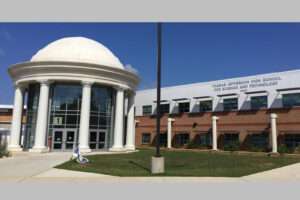The Volokh Conspiracy
Mostly law professors | Sometimes contrarian | Often libertarian | Always independent
Federal Agencies Neglect Anti-Asian Discrimination in Education
My wife Alison Somin, an attorney with the Pacific Legal Foundation, outlines the problem.

My wife, Alison Somin (an attorney with the Pacific Legal Foundation, and former special assistant at the US Commission on Civil Rights) has an article about anti-Asian discrimination in education, and how federal agencies have mostly ignored it:
Discrimination against Asian-American students in admissions at selective universities has been an open secret for decades. An entire cottage industry even coached ambitious applicants on how to be less Asian. Data produced in litigation showed that for applicants with academic credentials in the top 10 percent of Harvard's pool, the odds of admission were 56.1 percent for African Americans, 31.3 percent for Hispanics, and 15.3 percent for whites, but only 12.6 percent for Asian Americans. In emails uncovered in the parallel lawsuit against the University of North Carolina, admissions officers were candid about preferring applicants of other races over Asian Americans. One representative exchange: "perfect 2400 SAT All 5 on AP one B in 11th" "Brown?!" "Heck no. Asian."
Yet the federal agencies charged with enforcing civil rights laws prohibiting this discrimination largely have done nothing in response. These agencies could have issued guidance emphasizing that such discrimination is forbidden or pursued targeted investigations against universities widely suspected of discrimination. But they have not….
Selective public magnet schools also discriminate against Asian Americans. The Fairfax County School Board restructured its admissions process to lower the number of Asian Americans at Thomas Jefferson High School, a top science and technology magnet program. The Board did not hide its intent: litigation produced private text messages, stating "there has been an anti [A]sian feel underlying some of this, hate to say it lol" and that Asian students were "discriminated against in this process." They lamented that "Asians hate us."
Represented by my firm, Pacific Legal Foundation, a parent group called the Coalition for TJ fought back, claiming that the changes violated the Constitution. Their case is currently pending a writ of certiorari at the Supreme Court.
School officials in Boston, New York City, and Montgomery County, Maryland, have similarly revised admissions procedures to lower the numbers of Asian American students in magnet schools there. In Boston, school officials were even caught mocking Asian American surnames on a hot microphone. In each of these cities, parent groups have sued, represented by Pacific Legal Foundation. These cases are pending in the federal appellate courts.
Again, federal civil rights agencies could have opened targeted investigations into anti-Asian discrimination in any of these school districts. They could have issued guidance letters reminding school boards of their legal obligations. They have not. In Coalition for TJ v. Fairfax County School Board, the Department of Justice even filed an amicus brief in the Fourth Circuit supporting the discriminating school district. It is difficult to imagine a similarly indifferent federal response if school officials spoke about members of any other racial group the way Fairfax County and Boston officials talked about Asian-American students.
What can be done to address this problem? As Alison suggests, a valuable first step would be for federal officials to deal with anti-Asian discrimination in education the same way they would with any other discrimination targeting racial minorities. The Supreme Court's recent decision in SFFA v. Harvard is the first Supreme Court ruling to take account of anti-Asian discrimination in higher education, and will make it easier to pursue remedies against it.
In previous writings about this issue, I and others have compared today's anti-Asian discrimination in education with anti-Semitic discrimination practiced by many elite educational institutions in the early to mid twentieth century. Recent outbreaks of anti-Semitism on campus in the wake of the Israel-Hamas war further highlight parallels between the two cases.
The distinctive left-wing version of anti-Semitism - focusing on the economic role of Jews - has some obvious parallels with left-wing rationales for anti-Asian discrimination. Both groups are stigmatized for their relatively high levels of success in education and business. Far-leftists tend to look on such success with suspicion, and this ideology has disproportionate sway in many educational institutions. On top of that, any group with a disproportionately high representation at elite schools (relative to their percentage of the population) makes it harder to achieve the goal of proportionate representation of all ethnic groups, an objective dear to hearts of many left-wing university officials.
The political right has its own awful history of both anti-Semitism and anti-Asian bigotry. But that in no way justifies the left-wing variants of these phenomena or vice versa.
As Alison notes, she is co-counsel for the plaintiffs in the Coalition for TJ case. I previously wrote about that case here and here.
Skeptics and conspiracy theorists (though not Volokh Conspiracy theorists!) may discount what I say on this topic because my wife is involved. But, for what it's worth, my interest in both anti-Asian discrimination in education and the more general issue of the use of "facially neutral" policies for discriminatory purposes long predates Alison's work on the TJ case. I first became interested in these problems when I attended a high school with a large number of Asian students in the late 1980s and early 90s (graduating in 1991). Classmates were worried about discrimination in elite-university admissions even back then.
UPDATE: It's worth noting that the Department of Education recently opened investigations into anti-Semitic discrimination at several universities and in NYC public schools. Whether they will take any meaningful action on anti-Asian discrimination in admissions remains to be seen.


Show Comments (60)